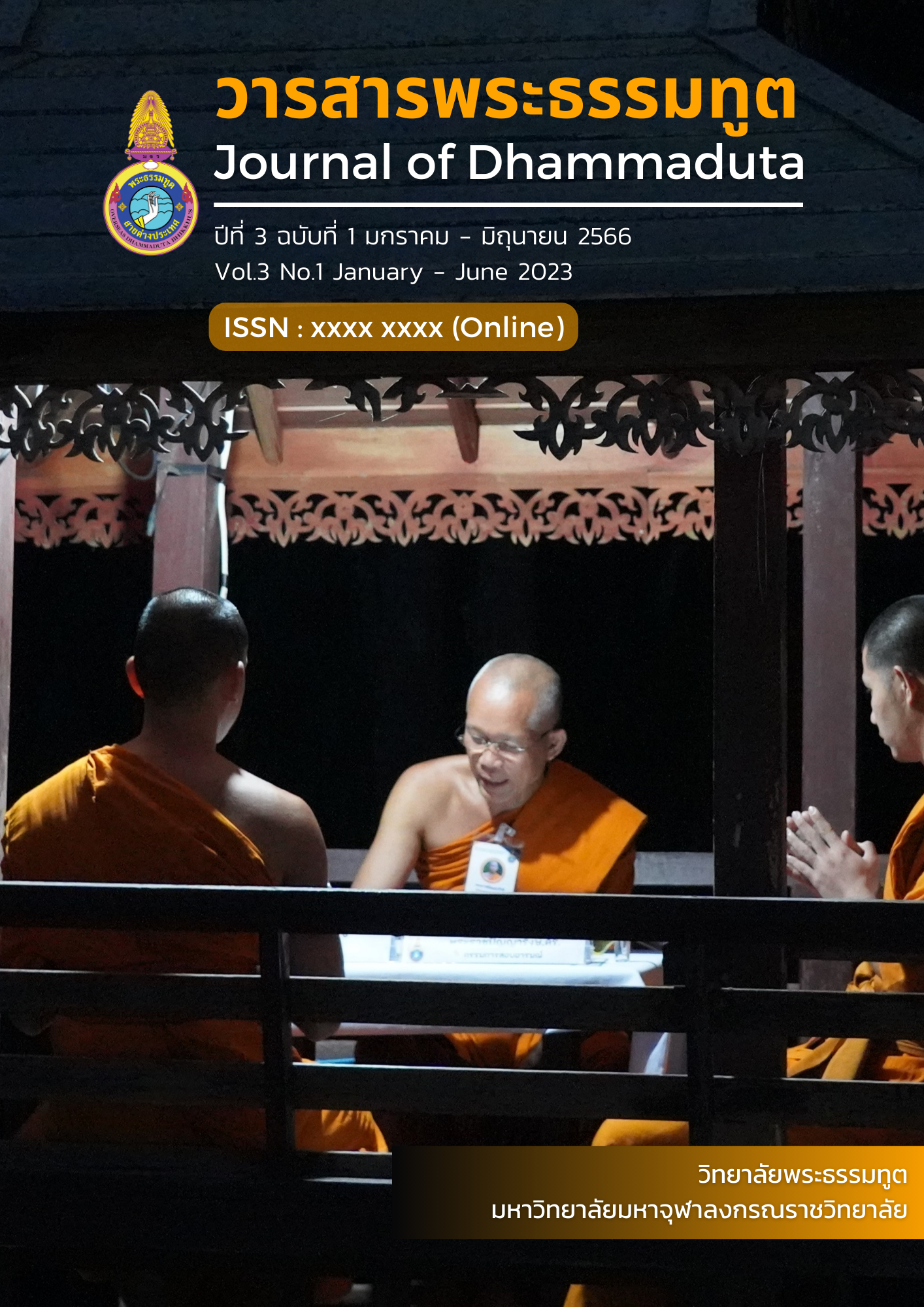Good Teachers, Good Students and Having a Good Future in Buddhist Society
Keywords:
Good teachers, Good students, Good future, Buddhist societyAbstract
The article titled “Good Teachers, Good Students and Having a Good Future in Buddhist Society” aims to explain the moral principles of good teachers and good students in Buddhism. It also explains Buddhist practices leading a good future. The results of the study revealed that the characteristics of a good teacher in Buddhism consisted of three main virtues: 1) Kalyāṇamittatā, teachers should be good friends and respected, 2) Six Principles, which are duties according to the principles of teaching, and 3) Brahmavihāra, which promotes teachers to be mature and respectful. In addition, a good student in Buddhism must follow three principles: 1) the Six principles are the principles of the student's duties. This principle will help teachers to have loving kindness in teaching knowledge, 2) Iddhipāda, which is the principle that helps achieve the goal of success in learning, and 3) Bahussuta, which is the practice for desirable graduating until the disciple can apply the knowledge to earn a living. In considering the good future of teacher and student in Buddhist society, it was found that both teachers and students must have a concept of living according to three virtues: 1)Appamāda: it is a very important principle because when teachers and students are careless, they will work efficiently, 2) Ditthadhammikattha: benefits helping to promote teachers and students to have a good future in the present life, and 3) the four virtues encourage the practitioner to receive love and kindness leading to four benefits: growth in age, beauty, happiness, and strength. All the results of the study indicate that the moral principles of being a good teacher in Buddhism would support the prosperity of a teacher, and the virtue of being good students in Buddhism helps support the prosperity of students. This is not only a teacher or student but also people in general, if they incorporate the concept of living according to the Dhamma principles. They will benefit their own lives and society
References
ข้อบังคับคุรุสภา ว่าด้วยจรรยาบรรณของวิชาชีพ พ.ศ. 2556. (2556. 4 ตุลาคม). ราชกิจจานุเบกษา. เล่ม 130 ตอนพิเศษ 130 ง. หน้า 72-74.
พระพรหมคุณาภรณ์ (ป.อ.ปยุตฺโต). (2554). พจนานุกรมพุทธศาสน์ ฉบับประมวลศัพท์. พิมพ์ครั้งที่ 17. กรุงเทพฯ: โรงพิมพ์พระพุทธศาสนาของธรรมสภา.
พระพรหมบัณฑิต. (2559). 100 วาทกรรมการบริหารการศึกษาของพระพรหมบัณฑิต. กรุงเทพฯ: ยูโรปา เพรส.
พระมหาโพธิวงศาจารย์ (ทองดี สุรเตโช ป.ธ.9. ราชบัณฑิต). (2559). พจนานุกรมไทย-บาลี. กรุงเทพฯ: วัดราชโอรสาราม ราชวรวิหาร.
พุทธทาสภิกขุ. (2515). ศึกษาตัวชีวิตคือการเลื่อนขั้นตนเอง. กรุงเทพฯ: ศึกษาภัณฑ์พาณิชย์.มหาจุฬาลงกรณราชวิทยาลัย. (2539).
มหาจุฬาลงกรณราชวิทยาลัย. (2539). พระไตรปิฎกภาษาไทย ฉบับมหาจุฬาลงกรณราชวิทยาลัย. กรุงเทพมหานคร: โรงพิมพ์มหาจุฬาลงกรณราชวิทยาลัย.
สมเจตน์ ผิวทองงาม และคณะ. (กรกฎาคม-ธันวาคม 2565). พุทธทาสภิกขุกับการพัฒนาวิญญาณความเป็นครู. วารสารปณิธาน. 2565; 18 (2): หน้า 52.
ไทยรัฐออนไลน์. (2565). [ออนไลน์]. “ฟันโทษวินัยครูทำร้ายนักเรียนรุนแรง”. [สืบค้นเมื่อวันที่ 18 มกราคม 2566] จาก https://www.thairath.co.th/news/local/bangkok/2481827.
บัณฑิตวิทยาลัย. (2561). [ออนไลน์]. “ความเป็นครู”. [สืบค้นเมื่อวันที่ 17 มกราคม 2566] จาก https://graduate.sru.ac.th/wp-content.pdf.
ch3plus. (2566). [ออนไลน์]. “รวบครูฝึกสอน ล่อลวงเด็ก ม.2 ไปล่วงละเมิดในวันครู”. [สืบค้นเมื่อวันที่ 18 มกราคม 2566] จาก ch3plus.com/news/.
PPTV Online. (2566). [ออนไลน์]. “คำขวัญวันครูปี 2566 ครูดี ศิษย์ดี มีอนาคต”. [สืบค้นเมื่อวันที่ 17 มกราคม 2566] จาก www.pptvhd36.com/news/การเมือง/187866
Micheal B. Wikinson and Hugh N. Cambell. (2010). Philosophy of Religion: An Introduction. New York: Continuum.

Downloads
Published
How to Cite
Issue
Section
License
Copyright (c) 2023 Journal of Dhammaduta

This work is licensed under a Creative Commons Attribution 4.0 International License.
The Journal of Dhammaduta | ISSN: xxxx-xxxx (online) | Responsible editors: Dr.Phramaha Prayoon Jotivaro. | This journal is published under the terms of the Creative Commons Attribution 4.0 International (CC-BY-NC-ND 4.0) by Dhammaduta College, Mahachulalongkornrajavidyalaya University - 79 Moo 1, Lamsai, Wang Noi, Phra Nakhon Si Ayutthaya 13170 Thailand






